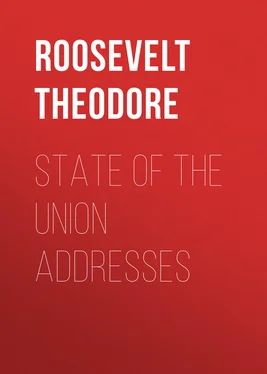Theodore Roosevelt - State of the Union Addresses
Здесь есть возможность читать онлайн «Theodore Roosevelt - State of the Union Addresses» — ознакомительный отрывок электронной книги совершенно бесплатно, а после прочтения отрывка купить полную версию. В некоторых случаях можно слушать аудио, скачать через торрент в формате fb2 и присутствует краткое содержание. Жанр: foreign_edu, Технические науки, Политика, на английском языке. Описание произведения, (предисловие) а так же отзывы посетителей доступны на портале библиотеки ЛибКат.
- Название:State of the Union Addresses
- Автор:
- Жанр:
- Год:неизвестен
- ISBN:нет данных
- Рейтинг книги:5 / 5. Голосов: 1
-
Избранное:Добавить в избранное
- Отзывы:
-
Ваша оценка:
- 100
- 1
- 2
- 3
- 4
- 5
State of the Union Addresses: краткое содержание, описание и аннотация
Предлагаем к чтению аннотацию, описание, краткое содержание или предисловие (зависит от того, что написал сам автор книги «State of the Union Addresses»). Если вы не нашли необходимую информацию о книге — напишите в комментариях, мы постараемся отыскать её.
State of the Union Addresses — читать онлайн ознакомительный отрывок
Ниже представлен текст книги, разбитый по страницам. Система сохранения места последней прочитанной страницы, позволяет с удобством читать онлайн бесплатно книгу «State of the Union Addresses», без необходимости каждый раз заново искать на чём Вы остановились. Поставьте закладку, и сможете в любой момент перейти на страницу, на которой закончили чтение.
Интервал:
Закладка:
The award is self-executing on the vital points. To make it effective as regards the others it only remains for the two Governments to appoint, each on its own behalf, one or more scientific experts, who shall, with all convenient speed, proceed together to lay down the boundary line in accordance with the decision of the majority of the Tribunal. I recommend that the Congress make adequate provision for the appointment, compensation, and expenses of the members to serve on this joint boundary commission on the part of the United States.
It will be remembered that during the second session of the last Congress Great Britain, Germany, and Italy formed an alliance for the purpose of blockading the ports of Venezuela and using such other means of pressure as would secure a settlement of claims due, as they alleged, to certain of their subjects. Their employment of force for the collection of these claims was terminated by an agreement brought about through the offices of the diplomatic representatives of the United States at Caracas and the Government at Washington, thereby ending a situation which was bound to cause increasing friction, and which jeoparded the peace of the continent. Under this agreement Venezuela agreed to set apart a certain percentage of the customs receipts of two of her ports to be applied to the payment of whatever obligations might be ascertained by mixed commissions appointed for that purpose to be due from her, not only to the three powers already mentioned, whose proceedings against her had resulted in a state of war, but also to the United States, France, Spain, Belgium, the Netherland Sweden and Norway, and Mexico, who had not employed force for the collection of the claims alleged to be due to certain of their citizens.
A demand was then made by the so-called blockading powers that the sums ascertained to be due to their citizens by such mixed commissions should be accorded payment in full before anything was paid upon the claims of any of the so-called peace powers. Venezuela, on the other hand, insisted that all her creditors should be paid upon a basis of exact equality. During the efforts to adjust this dispute it was suggested by the powers in interest that it should be referred to me for decision, but I was clearly of the opinion that a far wiser course would be to submit the question to the Permanent Court of Arbitration at The Hague. It seemed to me to offer an admirable opportunity to advance the practice of the peaceful settlement of disputes between nations and to secure for the Hague Tribunal a memorable increase of its practical importance. The nations interested in the controversy were so numerous and in many instances so powerful as to make it evident that beneficent results would follow from their appearance at the same time before the bar of that august tribunal of peace.
Our hopes in that regard have been realized. Russia and Austria are represented in the persons of the learned and distinguished jurists who compose the Tribunal, while Great Britain, Germany, France, Spain, Italy, Belgium, the Netherlands, Sweden and Norway, Mexico, the United States, and Venezuela are represented by their respective agents and counsel. Such an imposing concourse of nations presenting their arguments to and invoking the decision of that high court of international justice and international peace can hardly fail to secure a like submission of many future controversies. The nations now appearing there will find it far easier to appear there a second time, while no nation can imagine its just pride will be lessened by following the example now presented. This triumph of the principle of international arbitration is a subject of warm congratulation and offers a happy augury for the peace of the world.
There seems good ground for the belief that there has been a real growth among the civilized nations of a sentiment which will permit a gradual substitution of other methods than the method of war in the settlement of disputes. It is not pretended that as yet we are near a position in which it will be possible wholly to prevent war, or that a just regard for national interest and honor will in all cases permit of the settlement of international disputes by arbitration; but by a mixture of prudence and firmness with wisdom we think it is possible to do away with much of the provocation and excuse for war, and at least in many cases to substitute some other and more rational method for the settlement of disputes. The Hague Court offers so good an example of what can be done in the direction of such settlement that it should be encouraged in every way.
Further steps should be taken. In President McKinley's annual Message of December 5, 1898, he made the following recommendation:
"The experiences of the last year bring forcibly home to us a sense of the burdens and the waste of war. We desire in common with most civilized nations, to reduce to the lowest possible point the damage sustained in time of war by peaceable trade and commerce. It is true we may suffer in such cases less than other communities, but all nations are damaged more or less by the state of uneasiness and apprehension into which an outbreak of hostilities throws the entire commercial world. It should be our object, therefore, to minimize, so far as practicable, this inevitable loss and disturbance. This purpose can probably best be accomplished by an international agreement to regard all private property at sea as exempt from capture or destruction by the forces of belligerent powers. The United States Government has for many years advocated this humane and beneficent principle, and is now in a position to recommend it to other powers without the imputation of selfish motives. I therefore suggest for your consideration that the Executive be authorized to correspond with the governments of the principal maritime powers with a view of incorporating into the permanent law of civilized nations the principle of the exemption of all private property at sea, not contraband of war, from capture or destruction by belligerent powers."
I cordially renew this recommendation.
The Supreme Court, speaking on December 11. 1899, through Peckham, J., said:
"It is, we think, historically accurate to say that this Government has always been, in its views, among the most advanced of the governments of the world in favor of mitigating, as to all non-combatants, the hardships and horrors of war. To accomplish that object it has always advocated those rules which would in most cases do away with the right to capture the private property of an enemy on the high seas."
I advocate this as a matter of humanity and morals. It is anachronistic when private property is respected on land that it should not be respected at sea. Moreover, it should be borne in mind that shipping represents, internationally speaking, a much more generalized species of private property than is the case with ordinary property on land–that is, property found at sea is much less apt than is the case with property found on land really to belong to any one nation. Under the modern system of corporate ownership the flag of a vessel often differs from the flag which would mark the nationality of the real ownership and money control of the vessel; and the cargo may belong to individuals of yet a different nationality. Much American capital is now invested in foreign ships; and among foreign nations it often happens that the capital of one is largely invested in the shipping of another. Furthermore, as a practical matter, it may be mentioned that while commerce destroying may cause serious loss and great annoyance, it can never be more than a subsidiary factor in bringing to terms a resolute foe. This is now well recognized by all of our naval experts. The fighting ship, not the commerce destroyer, is the vessel whose feats add renown to a nation's history, and establish her place among the great powers of the world.
Читать дальшеИнтервал:
Закладка:
Похожие книги на «State of the Union Addresses»
Представляем Вашему вниманию похожие книги на «State of the Union Addresses» списком для выбора. Мы отобрали схожую по названию и смыслу литературу в надежде предоставить читателям больше вариантов отыскать новые, интересные, ещё непрочитанные произведения.
Обсуждение, отзывы о книге «State of the Union Addresses» и просто собственные мнения читателей. Оставьте ваши комментарии, напишите, что Вы думаете о произведении, его смысле или главных героях. Укажите что конкретно понравилось, а что нет, и почему Вы так считаете.












